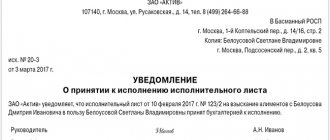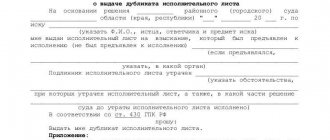Domestic legislation allows suspend alimony, if the payer has serious circumstances (loss of job, disability). Unauthorized suspension of payments is unacceptable - a person will need to contact the bailiffs or the court with a corresponding application. The recipient can also initiate the suspension of alimony. In addition, the law establishes the grounds for termination of alimony payments.
Let's consider how to legally suspend the payment of alimony, when it is permissible to completely stop providing financial support to the former family.
Basic information
If the parents agreed on child support on their own by concluding an agreement, then in the text of the document they had to indicate the grounds on which financial payments could be temporarily suspended - for example:
- the appearance of a serious illness requiring prolonged hospitalization;
- loss of job;
- going on a long business trip (in the latter case, you can set the condition that alimony will be paid before the trip).
If the alimony provider transfers funds in accordance with a court order, then failure to pay alimony within the strictly established time frame without significant grounds will lead to the corresponding punishment:
- for small debts - fines, penalties (in the accounting department of the enterprise, all necessary payments will be collected from the debtor’s salary);
- in case of a large debt - seizure of the debtor’s property and sale of his property, confiscation of a driver’s license, ban on traveling abroad.
As a result, it is in the interests of the alimony provider to agree with the recipient of the funds that the alimony payments be suspended. The payer can also contact the appropriate authorities and inform about the temporary inability to pay alimony. The law does not allow sudden suspension of payments at a person’s personal discretion.
The alimony recipient has the opportunity to agree with the recipient of the funds to suspend payments for a while and enter into an agreement on alimony subsequently if he is currently paying the money in accordance with the court order.
General information on the law
Unlike the judicial method of collecting alimony, a voluntary agreement between spouses may contain the necessary clauses, according to which the payer has the right to suspend the performance of his financial obligations. The parties come to agreements, indicating any reasons upon the occurrence of which payments for the child temporarily cease to be received.
Reasons why alimony payments may be terminated under an agreement:
- Serious illness of the debtor;
- Loss of basic income;
- Death or illness of a close relative.
If the conditions listed above occur, the payer has the right not to pay the monthly amount established by the document, while penalties and interest should not be accrued until the end of the difficulties in the debtor’s life.
In cases where the reason for assigning child support obligations was a court decision on a claim from the second parent, it is impossible to suspend payments or completely get rid of them without compelling reasons, and in order to complete this there will necessarily be interaction with the bailiff.
Procedure for suspending payments
When the parents entered into a child support agreement, the payer, if financial difficulties arise, is recommended to promptly contact the bailiffs. If this is not done, then the recipient of alimony may file a claim with the court in order to begin enforcement proceedings, registering the claim with the bailiffs.
How to file a claim for alimony in court?
The alimony holder will need to take the following actions:
- prepare an application for the SSP, and if the bailiffs refuse, then go to court;
- attach to the application a package of documentation confirming the existence of grounds for suspending alimony payments;
- obtain a ruling from the SSP or court.
During the trial or consideration of the case in the SSP, the alimony recipient is not exempt from transferring funds, including payment of penalties, fines and repayment of accumulated debt.
An application with documents can be submitted in the following ways:
- personally;
- by seeking help from a representative by proxy;
- by sending by mail with a list of enclosed documents and notification of delivery.
At the same time, the recipient of alimony has the opportunity to appeal the decision of the bailiffs or the court.
In a court
The Law on Enforcement Proceedings provides for a number of cases when execution is suspended by the court. They are also divided into two categories:
- when suspension is mandatory;
- when it is carried out at the discretion of the court.
Cases of mandatory suspension of alimony execution by the court, as a rule, are not related to the collection of alimony. Suspension is carried out when a claim is filed to release property from seizure or challenge the results of its assessment.
At the discretion of the court, the execution of alimony may be suspended in the following cases:
- challenging a judicial act on the collection of alimony or a writ of execution issued on its basis;
- the alimony payer is on a long business trip;
- challenging the actions of the bailiff to collect alimony;
- in other cases provided by law.
Due to bankruptcy
During the period of bankruptcy of the debtor, the collection of alimony is not suspended. This follows from paragraph 1 of Art. 69.1 of the Law on Enforcement Proceedings.
Expert opinion
Lawyer Alexander Vasiliev comments
This article provides for the duty of the bailiff to suspend execution of property penalties upon the onset of bankruptcy of a citizen, with the exception of certain cases. The collection of alimony is mentioned among the exceptions that are not affected by a citizen’s bankruptcy.
If the child began to live with a child support provider
The alimony provider has the opportunity to postpone enforcement proceedings if the minor child began to live with him and refuses to return to the previous parent. To do this, he needs to contact the magistrate and prove the fact that the child lives with him in the same territory. The presence of the second spouse is not necessary. The judge will issue an order that enforcement proceedings on alimony are suspended, and the alimony provider will have the opportunity not to transfer funds to the ex-spouse.
The next step is to file a claim for alimony payments to the second spouse.
The final step is to file a claim with the district court at the address of the former spouse’s residence to deprive him of parental rights, as well as to determine the address of residence of the child together with the applicant. The plaintiff will need to obtain a court order that the child lives with the initiator of the lawsuit.
Terms of consideration
The bailiff is obliged to consider the request to suspend proceedings for open collection within 5 days.
The court has a longer period - 30 days, since the application will be considered in the manner established for issues arising from the execution of a court decision.
If there is a delay in considering the application by the bailiff, his actions can be appealed to the court. But as mentioned above, it is better to immediately apply for a suspension to the court that issued the writ of execution.
Suspension of alimony at the initiative of the recipient
If the parties have agreed on alimony payments, then the recipient of the funds can also initiate their suspension. A person has the right to revoke the writ of execution (this entails the suspension of enforcement proceedings) and then resubmit it.
Is it possible to revoke a writ of execution for alimony?
A person will need to perform only 2 actions.
- submit an application to revoke the writ of execution;
- receive a writ of execution after the bailiff makes a decision.
Below is one possible application option.
Enforcement proceedings will be suspended from the moment the applicant submitted this document to the SSP.
If the alimony holder has debts, he will still need to pay them off, despite the revocation of the writ of execution. Financial obligations to provide the child with material support also remain. The suspension of enforcement proceedings only leads to a temporary “respite” for the alimony worker.
Through the bailiff
The bailiff is obliged to suspend the collection of alimony in the cases provided for in Art. 40 of the Law on Enforcement Proceedings. These include:
- Incapacity of the alimony payer;
- His participation in hostilities as part of the Armed Forces of the Russian Federation, other troops and military formations, the debtor’s performance of tasks in conditions of a state of emergency or martial law or armed conflict;
- On other grounds provided by law.
In addition, in a number of cases, suspension is a right, and not an obligation, of the bailiff:
- The alimony payer is undergoing hospital treatment;
- The debtor's request for suspension if he is undergoing military service under conscription.
Grounds for termination of alimony obligations
According to Art. 120 of the RF IC, the following grounds for termination of alimony obligations are determined:
- one of the parties to the agreement died;
- a disabled person from childhood has acquired legal capacity;
- the child has reached adulthood;
- the child was adopted;
- the parent who received alimony got a job and found his own source of income (for example, alimony was established during maternity leave);
- the parent receiving alimony registered a new marriage.
Another basis for terminating alimony is the disputed fact of paternity. Practice shows that it is usually the father who initiates this procedure. Genetic testing with almost 100% probability refutes or proves the presence of a family relationship between the alimony provider and a minor child.
Moreover, if the child support provider, when entering his full name on the birth certificate, knew that the child was not his relative, then his claim will be rejected in court.
To draw up a claim, the initiator of the litigation must indicate in the document the following information:
- name of the court;
- Full name of the plaintiff and defendant without abbreviations;
- details of the circumstances, indicating how the applicant’s rights were violated;
- cost of claim;
- grounds for canceling deductions;
- list of documents attached by the plaintiff.
As for the required documents, these include the following:
- passport;
- photocopy of the child's birth certificate;
- a photocopy of the dissolution of the marital union;
- certificate of family composition;
- photocopies of documents containing information about the grounds on which it is permissible to terminate the payment of alimony;
- alimony agreement or court order for their appointment.
Is it possible to suspend alimony payments?
There are two ways to pay child support:
- voluntary _ Typically, both parties enter into an agreement and have it certified by a notary office. In the document they stipulate their conditions for making/receiving payments, the schedule for depositing funds, and payment methods. Oral agreements do not carry any legal weight, therefore they have no relation to official agreements;
- forced recovery through court . This method is resorted to much more often, since most broken couples cannot find a compromise on the size of payments and the schedule for making them. It is easier to resolve these controversial issues with the involvement of a third independent party, which is the court. After the court ruling and its entry into force in case of refusal to pay, the defaulter will be officially considered a violator, who will be dealt with by the bailiffs.
The agreement can be terminated and the court’s decision can be challenged by filing an official request (petition) explaining the reasons that must become compelling circumstances for changing it.
If one of the spouses, after an official divorce, was obliged by a court decision to pay alimony, and one fine day decided to stop making financial contributions, the payer must have a good reason for this.
It is important to distinguish between the termination or suspension of alimony payments by a court decision and at one’s own request, which in this case is equivalent to a violation of the law and will invariably entail punishment. In this case, it is completely irrelevant whether the reasons for committing such actions were compelling.
Even if the court decides in favor of the alimony-obliged person, he will be required to pay the debt that accumulated after the violation of the schedule in the period of time between the willful termination of contributions and the court’s decision.
When is it permissible to terminate alimony for a wife?
Art. 89 of the RF IC provides for alimony, which is transferred to a disabled spouse. A woman has the right to demand financial support from her ex-husband when she is carrying a child or caring for an infant under 3 years of age, has lost her ability to work, lives with a disabled child and is unable to find a job.
The alimony provider has the right to stop transferring funds if the woman remarried or the child no longer requires care.
Consideration of the application and legal consequences
The court decides on the resumption of enforcement proceedings within 10 days (Article 440 of the Code of Civil Procedure of the Russian Federation). Interested parties are notified about the date of consideration of the application: the bailiff, the alimony provider, the recipient of payments. The failure of these persons to appear is not an obstacle to the consideration of the document. As a result, the judge makes a ruling:
- resume enforcement proceedings if the evidence provided is convincing;
- refuse renewal unless there are compelling reasons.
If one of the parties disagrees with the verdict, the decision can be appealed.
When sending an application to the FSSP, it must be transferred to the responsible bailiff within 3 days . The bailiff considers the application within 10 days , after which he makes a decision:
- on the renewal of individual entrepreneurs;
- about refusal;
- on the partial renewal of individual entrepreneurs.
The document is sent by mail indicating the address of the claimant. In the future, the determination will be sent to the addressee no later than 1 day from the moment of receipt at the post office (clause 2, article 24 of Law No. 229-FZ).
Suspension of alimony can be carried out by a court or by order of a bailiff. According to the law, the judicial authorities and the bailiff service resume enforcement proceedings automatically as soon as the reasons for suspension disappear. However, information about the abolition of grounds for termination of payments may be received with a significant delay, so the claimant has the right to legally file an application for the restoration of enforcement proceedings, supporting the information presented with evidence.
FREE CONSULTATIONS are available for you! If you want to solve exactly your problem, then
:
- describe your situation to a lawyer in an online chat;
- write a question in the form below;
Let's sum it up
If the child support provider has financial difficulties (loss of job, serious illness), then the legislation provides him with the opportunity to suspend the provision of financial assistance to the child. However, for this you will need to contact the appropriate authorities, providing an application and the necessary documents. You can also try to come to an agreement with the recipient of alimony so that he becomes the initiator of the suspension of payments.
It is prohibited to suspend payments on your own - this entails the accrual of fines and penalties, the formation of debt and other unpleasant consequences.
How to resume enforcement proceedings
Resumption is carried out by a “ruling” of the court if the reasons that led to the suspension are eliminated, for example, when the alimony provider returns from a business trip or is discharged from a medical institution, or when the complaint against the bailiff is withdrawn.
Despite the absence of direct instructions for filing an application to renew an individual entrepreneur (Article 440 of the Code of Civil Procedure of the Russian Federation), the most interested party - the recipient of alimony - is recommended to notify the bailiff that the reasons for the suspension have been eliminated. In practice, the payer either does not notify the FSSP employee at all about the possibility of resuming payments, or seeks to avoid liability for as long as possible.
Where to apply
If it is reliably known that the proceedings in the case were temporarily stopped at the initiative of the FSSP and there are no longer any obstacles to the resumption of the IP, the claimant must contact the department of the service that previously considered the case.
If the suspension occurred in accordance with a court order, you must apply to the court for renewal.
Under what circumstances should you not suspend alimony payments?
But sometimes, unscrupulous payers suspend payments for their minor children without any serious reasons, which is unacceptable. After all, a minor child who does not know how to provide for himself is in great need of financial support from his parents, especially if he grows up in a single-parent family. And a parent who has left the family and abandoned his child should always remember this.
Under no circumstances should you suspend payments during the mother’s maternity leave, or in other situations when she herself will not be able to earn money to feed the baby.
Termination and resumption of enforcement proceedings
If the withholding of alimony payments was suspended for some reason, then in the future it will be possible to collect the debt only for the past 3 years.
The procedure for enforcement proceedings and other procedural work is regulated by Federal Law of the Russian Federation No. 229 “On Enforcement Proceedings”. The executive documentation, which serves as the basis for withholding alimony, is stored in the FSSP. In the event that the forced collection of funds in favor of children is stopped on legal grounds, neither party can re-announce the beginning of the collection of alimony after the end of the period of fulfillment of obligations.
This is important to know: How to collect alimony debt after 18 years
Withholding of alimony payments may be suspended for a certain period of time in accordance with the reasons established at the legislative level. In this case, the alimony recipient or the bailiff may initiate the resumption of the procedure for withholding money in favor of the children. The executive documentation continues to be valid in accordance with legislative norms.
To resume the procedure for collecting alimony payments, the interested person should contact the FSSP, where the enforcement documentation was submitted. To start withholding money, you will need to write a corresponding application.
If the payment of alimony was suspended by court order, then in order to resume the withholding of alimony, you must contact the court that made the corresponding decision.
The fulfillment of alimony obligations may be terminated in whole or in part. In the latter case, part of the money will not be transferred to the claimant’s account if one of the parties submits an application to review the recalculation of the amount of alimony carried out by the bailiff.









